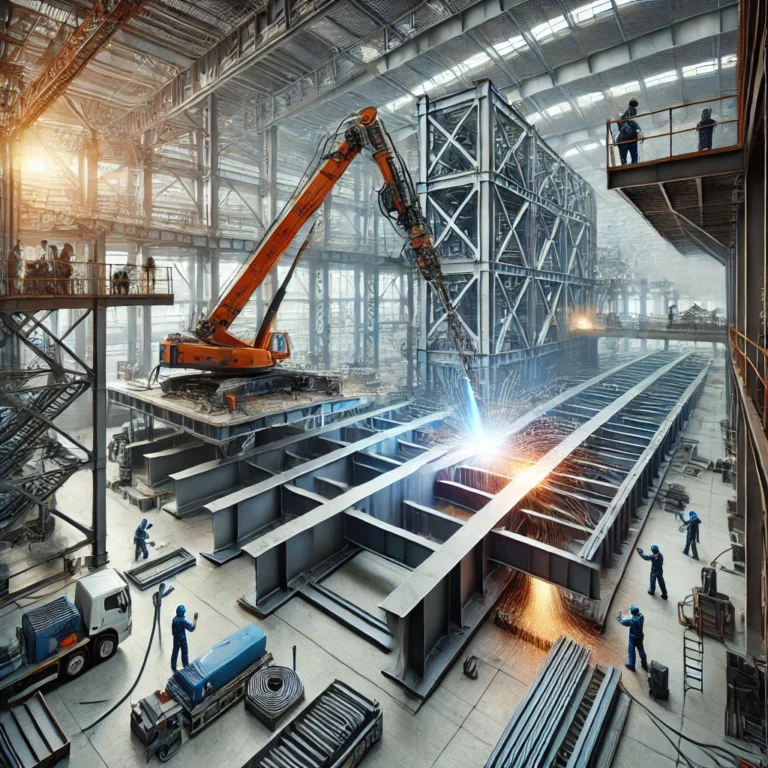The Steel Fabrication Process: Key Benefits and Top Applications
Steel fabrication plays a crucial role in modern construction and manufacturing. This process involves cutting, shaping, and assembling steel into final products used in various industries. By choosing the right steel fabrication service, you can ensure that your project benefits from high-quality, precise, and durable steel structures.
In this guide, we’ll explore the steel fabrication process, the benefits of using steel, and common applications across different industries.
Steel Fabrication Process
The steel fabrication process is complex and requires careful planning at each step. By following these essential steps, fabricators turn raw steel into reliable products used in construction, automotive, and other industries.
- Cutting & Bending First, steel is cut into specific sizes using laser cutting, plasma cutting, or sawing techniques. Precision is key here to ensure that each piece fits perfectly later in the process. After cutting, the steel undergoes bending to form the desired shapes. This step is crucial because properly bent steel ensures that the final product is structurally sound and aesthetically pleasing.
- Assembling Once the steel is cut and bent, the pieces are assembled to form frames, supports, or other components. During this stage, it’s important that the parts align correctly. Skilled workers ensure that the assembly is both accurate and stable.
- Welding Welding brings the steel components together into a solid, cohesive structure. Skilled welders use techniques like arc welding or gas welding to join the pieces. When done properly, this creates a strong bond that can withstand heavy loads and extreme conditions.
- Quality Control Throughout the fabrication process, rigorous quality checks are conducted. Inspections are performed at each stage to ensure the steel meets industry standards. These checks help prevent defects and ensure that the final product is safe and reliable.
- Surface Treatment To protect the steel from corrosion, it is coated with materials such as galvanizing or paint. This coating helps extend the steel’s lifespan, allowing it to withstand harsh environmental conditions.

Benefits of Steel Fabrication
Steel fabrication offers a range of benefits that make it the preferred choice in many industries.
- Durability Fabricated steel is highly durable and able to withstand extreme loads, making it ideal for construction and heavy machinery. Steel structures can resist damage from weather, fire, and other environmental factors.
- Flexibility One of the key advantages of steel is its flexibility. Fabricators can mold steel into complex shapes, allowing for creative designs and innovative solutions. This flexibility makes it perfect for both large-scale projects and detailed, intricate designs.
- Cost-Effectiveness Steel is lightweight compared to other building materials, which reduces transportation costs. Additionally, its strength and durability mean fewer repairs and replacements over time, leading to long-term cost savings.
- Sustainability Steel is a fully recyclable material. By using recycled steel, companies can reduce the need for new raw materials and help protect the environment. This makes steel a sustainable choice for many projects.
Applications of Steel Fabrication
Steel fabrication plays a vital role in various industries. Some of the most common applications include:
- Construction Steel is widely used in building skyscrapers, bridges, and industrial facilities. Its strength and flexibility allow architects and engineers to design large, durable structures. Steel frames also reduce construction time, making them an efficient solution for large projects.Explore how steel improves construction efficiency.
- Automotive Industry In the automotive sector, steel is essential for vehicle frames and parts. Fabricated steel ensures the production of safe, reliable vehicles that meet high performance standards.
- Shipbuilding Ships and marine vessels rely on steel for their hulls and other key components. Steel’s corrosion resistance and strength make it ideal for shipbuilding, especially for vessels that operate in harsh marine environments.
- Energy Sector Steel fabrication is critical in the construction of pipelines, oil rigs, and wind turbines. These energy infrastructure projects require materials that can withstand high pressure and extreme weather, making steel an excellent choice.
- Aerospace Industry The aerospace industry demands lightweight, strong materials. Steel fabrication allows for the creation of components that ensure aircraft are both sturdy and efficient.
How to Choose the Right Fabrication Service
Selecting the right fabrication service can make or break your project. Here are a few things to consider:
- Experience and Expertise Look for a company with experience in your industry. Their knowledge will ensure they understand your specific needs and deliver results that meet your expectations.
- Technology and Equipment Advanced technologies like CNC machines and automated welding systems provide better accuracy. Choose a company that invests in state-of-the-art equipment to ensure precision and efficiency.
- Certifications and Standards Make sure the fabrication company complies with industry standards and has certifications like ISO 9001. This ensures they follow quality management practices and produce high-quality products.Find out how ISO 9001 Certification improves product reliability.
Conclusion
Steel fabrication is an essential part of construction, manufacturing, and other industries. It offers durability, flexibility, and cost-efficiency, making it an ideal material for various projects. By understanding the fabrication process and the benefits of using steel, you can make informed decisions when selecting a fabrication partner.
Whether you’re working on a large construction project or designing machinery, choosing the right steel fabrication service will ensure the success and longevity of your project.
